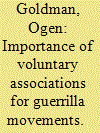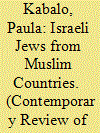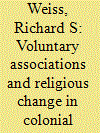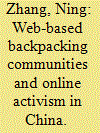| Srl | Item |
| 1 |
ID:
123954


|
|
|
|
|
| Publication |
2013.
|
| Summary/Abstract |
The question I examine in this article is why is it that under certain circumstances a guerrilla movement succeeds while under others it fails? The hypotheses that I shall present below are the greater the number and variety of voluntary associations supporting the guerrilla movement, compared with the number of associations supporting the regime, the greater is the guerillas' level of success. Voluntary associations can fulfill the guerrilla's basic needs: resources, organizational ability, and obligation. Achieving these needs assist the guerrilla in realizing: population support; inter-class allies; military force; governmental function, which in turn allows the realization of the political objectives.
|
|
|
|
|
|
|
|
|
|
|
|
|
|
|
|
| 2 |
ID:
169982


|
|
|
|
|
| Summary/Abstract |
This article sheds light on the salient and far-reaching pattern of association-forming among Jewish immigrants from Muslim countries in Israel during the 1950s and 1960s. They were formally established associations that operated by means of representatives and spokespersons and strove to mediate between the population group that they represented and the state authorities that dealt with immigration and its integration. Interestingly, although few of the members or leaders of these entities have lived under democratic regimes, they established organizations that operated on the basis of democratic principles: election of representatives, holding members’ assemblies, and freedom of expression. They articulated their positions publicly and openly and were not deterred from criticizing policymakers, even those in the highest of echelons.
|
|
|
|
|
|
|
|
|
|
|
|
|
|
|
|
| 3 |
ID:
157868


|
|
|
|
|
| Summary/Abstract |
This article examines the impact of Western discourses of religion and community on Tamil Shaivism in the 1860s and 1870s. I focus on Ramalinga Adigal, one of the most important and innovative Tamil Shaiva leaders of the time. In 1865, Ramalinga founded a new society that incorporated features of Western associational culture, including an emphasis on individual ethical transformation, social activism, charitable outreach and voluntary association. Yet, at the same time, he drew on Shaiva devotional and Tantric traditions. I conclude that the impact of Western conceptions of religion was gradual and uneven, especially on the margins of colonial cosmopolitanism.
|
|
|
|
|
|
|
|
|
|
|
|
|
|
|
|
| 4 |
ID:
133734


|
|
|
|
|
| Publication |
2014.
|
| Summary/Abstract |
This article examines activism that has emerged in online communities. This ethnographic study of two web-based backpacking communities shows that citizens and activists use the Internet mainly for forming communities, sharing information, instilling democratic values and solving immediate social problems. They do not call for cyberwar, acts of hacktivism or other sorts of offensive online and offline actions, but seek to bring social justice and improve well-being within their sphere of influence. The dynamics of this new online activism and its significance for the development of associational life and civil society in China are explored in this article.
|
|
|
|
|
|
|
|
|
|
|
|
|
|
|
|